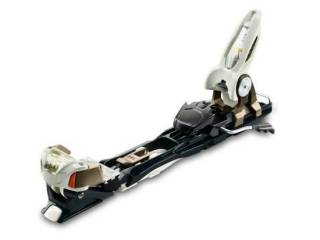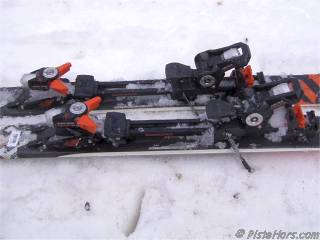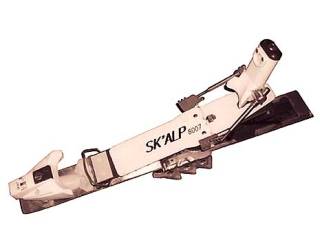Marker Duke Nukes em?
Last weekend we spent a day touring in the south-Savoie and a day in resort. The contrast to our backcountry eyes couldn’t have been more stark. Out in the high mountains with routes of 1500 to 2000 vertical meters nearly everyone is on Dynafit bindings even if skinny “matchstick” skis have slowly given way to larger “freeride” boards. Our resort day was surprising, surprising in the number of skiers now equipped with touring bindings in order to practise a bit of “sidecountry” skiing. Short climbs from the top of ski lifts to find stashes of fresh powder long after the visible runs are tracked out.

Marker Duke looks bomb proof
For sidecountry, the weapons of choice are Fritschi Freerides, Naxos and the derivative Dynastar Early Tram. These are recognizably touring bindings even if they can take a reasonable amount of resort pounding. Fritschi even made an alpine binding based on the same pattern.

Early Tram, coming to a resort near you
People have often asked why isn’t it possible to simply mount an alpine binding on a touring plate. You have all the advantages of good release and high DIN settings but would be able to unlock the heel for touring. We’ve been here before. One example was the Petzl / Sk’Alp 8007 binding from the 1980s. A Salomon 447 toe piece was connected to a modded Look heel unit via a plastic plate. The main disadvantage was that it used a seperate toe unit for climbing, requiring you to remove skis to go from climb to descent mode and the binding used leashes rather than ski brakes.

blast from the past, the Sk’Alp 8007
It seems like an idea whose time has come. Marker are making a foray into the growing backcountry snowsports sector with the Duke. Unveiled at the Munich ISPO and Vegas SIA trade shows the Duke offers a DIN 16 alpine binding with freeheel functionality. Parts are shared with Marker alpine bindings but this unit is said to be the result of two years in research and development. A solid chassis links the toe piece with the heel unit and this also enables the heel to be adjusted for different boot lengths. Something that will please hirers. The binding integrates a ski brake. The front pivot point is just under the toe, none of the complexity of the Naxo so it should be solid but still offer a reasonable stride. The unit locks down onto a plate screwed to the ski using a level under the foot. Like the Sk’Alp 8007 you must remove the boot to change from climb to ski mode. In practise this probably won’t bother the majority of skiers. As with the 8007 weight seems to be a problem with the Duke said to be 400 grams heavier than a Naxo 21 although metal parts are used extensively. Plus ça change, plus c’est la même chose. The Duke has picked up the European Ski Awards best ski binding for 2007 category as wel as an ISPO Outdoor Award.
The Duke will appeal to skiers who are going to be doing very little climbing. In France, with its extensive lift system, this could be quite a sizable market with many routes requiring just a few hundred meters of vertical to access. Assuming the binding proves to be reliable enough you can imagine the typical skier as someone spending a morning doing light tours, including some cliff hucking and an afternoon pounding the slopes. Will the alpine heritage and DIN 16, as opposed to the Naxo/Fritschi DIN 12 really give it the edge for skiers looking for a single quiver setup. We are not totally convinced.
Further Informaiton
Marker Duke review
Posted by
davidof on Monday, 05 February, 2007 at 07:46 PM
Of course - following on from the first comments in this thread -there are now crampons available for these - in 2 widths.
Posted by on Thursday, 26 February, 2009 at 08:49 AM
I am very happy with my Legend 8000 with Duke setup. Let’s not forget we are talking freeride, which is in my case is usually just a mile or two skinning up to access something good and untracked. I have now done three months off piste in this exceptional year and the weight problem was hardly noticed.
Posted by on Monday, 16 March, 2009 at 07:20 PM
I’ve used Diamar, Naxo and the Duke bindings extensively for “sidetouring”.
Yes, the Duke does give better edge control and this is at the expense of weight and being slower to switch between climbing and descending. But when did anyone need better edge control when touring, or for that matter, on powder?
The Duke is a freeride binding, for those who wish to ski fast, and occasionally do short skins. For that they are a great binding. The review is accurate.
Posted by on Wednesday, 02 December, 2009 at 02:38 PM
Comments are now closed



